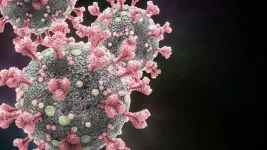Science Advances publishes proteomics technology from Oblique Therapeutics AB
Gothenburg, Sweden, April 16th, 2021 Oblique Therapeutics AB, a Sweden-based biotech company, in collaboration with Karolinska Institutet (Stockholm, Sweden), Gothenburg University (Sweden) and several local biotechs published promising research results
2021-04-16
(Press-News.org) Science Advances publishes proteomics technology from Oblique Therapeutics AB with a potential to bring several novel antibody medicines to large patient populations in multiple disease areas
Gothenburg, Sweden, April 16th, 2021 - Oblique Therapeutics AB, a Sweden-based biotech company, in collaboration with Karolinska Institutet (Stockholm, Sweden), Gothenburg University (Sweden) and several local biotechs published promising research results in the highly-acclaimed scientific journal Science Advances (AAAS) entitled: Rational Antibody design for Undruggable Targets using Kinetically Controlled Biomolecular probes. The peer-reviewed article describes how Oblique Therapeutics´ Abiprot® technology can be used to discover and develop pharmacologically tailored antibodies against clinically important targets widely considered undruggable with antibodies. Two example antibodies are presented in the article. One is targeting hTRPV1, a clinically validated pain target. The second antibody is targeting KRAS, a highly relevant oncogene of critical importance in the etiology of many aggressive cancers (ex: pancreatic cancer). These early results have the potential to contribute to the development of much needed novel medicines across several therapeutic areas.
The global antibody therapeutics market is estimated to be worth close to 200 Bn USD in 2026 (MarketWatch). Surprisingly, only about 60 antibody medicines (based on target), are currently available to patients. Important target classes such as G-protein-coupled receptors and ion channels are particularly underexploited. In contrast, there are about 1,500 known drug targets of which several are clinically or human-genetics validated. Novel medicines addressing these drug targets would bring game changing benefits to large populations of patients suffering from uncurable, untreatable, and refractory disease. A staggering example is the need for new pain medications to replace the unsatisfactory and addictive morphine and opioid regimens. But here, and in many other therapeutic areas, current antibody technologies fail to deliver meaningful medicines.
The research article in Science Advances presents a new high-tech antibody discovery approach called Abiprot®, developed from nanoscience, computer technology, and proteomics. Abiprot® identifies antibody binding sites on native-state, disease-relevant proteins at high resolution. The platform was developed by Oblique Therapeutics with the intention to create new antibody medicines addressing large unmet medical needs across several therapeutic areas. As an example, the paper demonstrates the first-ever stimuli-selective monoclonal antibody targeting TRPV1, prospectively developed for replacing opioids in pain management. Another example includes novel mutant-selective KRAS antibodies providing means to target the most prevalent KRAS mutated cancers.
Prof. Owe Orwar, CEO Oblique Therapeutics: "The excitement and joy of science and technological advancement is to prove that what was previously impossible or highly improbable is now possible. Even more satisfying is if the impossible or improbable translate into a hope for creating higher societal values, better health, and improved quality of life for millions of patients. Our dream is that the published technology will widen the scope of antibody therapeutics for the benefit of patients and we are very excited about what the future will hold. Science Advances, is globally ranked as the number three scientific journal in multidisciplinary sciences only after Nature (Springer Nature Limited) and Science (AAAS). To be able to publish company-critical results in Science Advances is therefore a testimony to the importance and potential impact of the study results. Since the conclusion of the published study, we have made significant advancements, and improvements in our antibody programs. For the TRPV1 antibody program we have entered into an R&D collaboration and exclusive option to licence agreement with a top-20 pharma company. A key component in our vision is to be the first-ever pharma company to bring a pain antibody medicine targeting ion channels to market".
INFORMATION:
Publication
The published article can be found here:
http://advances.sciencemag.org/
Collaboration
The research was conducted by Oblique Therapeutics AB in collaboration with scientists from:
The Department of Physiology and Pharmacology, Karolinska Institutet, Stockholm, Sweden
https://ki.se/en/fyfa/department-of-physiology-and-pharmacology
Gothenburg University, Sweden
https://www.gu.se/en
Integrative Research Laboratories, Gothenburg, Sweden
https://www.irlab.se
Fluicell AB, Mölndal, Sweden
https://fluicell.com
Nanoxis Consulting AB, Gothenburg, Sweden
https://nanoxisconsulting.com
Support
The study was supported by Sweden's innovation agency Vinnova
https://www.vinnova.se/
About Abiprot®
Abiprot® is a proprietary methodology to identify epitopes on protein targets that have previously proven difficult to address with antibodies. Abiprot® can identify high-affinity antibody binding sites in a given protein with single amino acid resolution while the protein resides in its native environment. It is based on using a tailored molecular reporter system and proteomics. The platform yields detailed sequence and structure information for epitope identification and development. Oblique Therapeutics is applying this technology for discovery of a new generation of selective antibody therapeutics targeting cancer and pain.
About Oblique Therapeutics AB
Oblique Therapeutics AB is a privately held Swedish biotech company developing innovative new medicines for severe diseases with a large unmet medical need focusing on pain and aggressive metastatic cancer. The company uses Abiprot®, an in-house-invented, next-generation antibody platform that can generate antibodies with programmed function against the full human proteome. https://obliquet.com/
For more information, please contact:
Prof. Owe Orwar, CEO Oblique Therapeutics
Email: owe@obliquet.com
Disclaimer
This press release may contain certain forward-looking information which reflect Oblique's current view of future events and operational developments. Words such as "intends", "estimates", "expects", "may", "plans", "deems", "believes", "assesses", and other similar expressions which imply indications or predictions regarding future developments or trends, and which are not based on historical facts, constitute forward-looking information. Forward-looking information is by nature affiliated with known and unknown risks and uncertainties since it is dependent on future events and circumstances. Forward-looking information does not constitute any guarantee regarding future results or development and the actual outcome may materially differ from forward-looking information. The information, assessments and forward-looking statements in this press release are only relevant as of the date of this press release and may change without notice.
"Special Notes to Reporters":
"More information, including a copy of the paper, can be found online at the Science Advances press package at https://www.eurekalert.org/jrnls/sciadvances/. You will need your user ID and password to access this information."
ELSE PRESS RELEASES FROM THIS DATE:
2021-04-16
New Haven, Conn. -- It is well established that autism occurs much more frequently in boys than in girls, and that girls seem to have a greater resilience to developing the condition. It has been unclear, however, why that is.
In a new Yale-led study, researchers find that autism may develop in different regions of the brain in girls than boys and that girls with autism have a larger number of genetic mutations than boys, suggesting that they require a larger "genetic hit" to develop the disorder.
The findings appear in the April 16 edition of the journal ...
2021-04-16
Aging entails a loss of muscle mass and strength, which in some cases impairs mobility, hinders walking or performance of day-to-day tasks, and exposes the elderly to the risk of falls and hospitalizations.
In clinical practice, handgrip measurement is the most widely used method to identify loss of overall muscular strength in older people. Values below 26 kg for men and 16 kg for women have for some time been considered an indication of risk-associated weakness, but these parameters are being revised.
Researchers at the Federal University of São Carlos (UFSCar) in the state of São Paulo, Brazil, collaborating with colleagues at other institutions in the same state such as the University of São Paulo's Ribeirão Preto Medical School (FMRP-USP), Nursing School ...
2021-04-16
Although antibodies induced by SARS-CoV-2 infection are largely protective, they do not completely protect against reinfection in young people, as evidenced through a longitudinal, prospective study of more than 3,000 young, healthy members of the US Marines Corps conducted by researchers at the Icahn School of Medicine at Mount Sinai and the Naval Medical Research Center, published April 15 in The Lancet Respiratory Medicine.
"Our findings indicate that reinfection by SARS-CoV-2 in health young adults is common" says Stuart Sealfon, MD, the Sara B. and Seth M. Glickenhaus Professor of Neurology at the Icahn School of Medicine at Mount Sinai and senior author of the paper. "Despite a prior COVID-19 infection, young people can catch the virus ...
2021-04-16
In recent years there has been an exhaustive study of red dwarf stars to find exoplanets in orbit around them. These stars have effective surface temperatures between 2400 and 3700 K (over 2000 degrees cooler than the Sun), and masses between 0.08 and 0.45 solar masses. In this context, a team of researchers led by Borja Toledo Padrón, a Severo Ochoa-La Caixa doctoral student at the Instituto de Astrofísica de Canarias (IAC), specializing in the search for planets around this type of stars, has discovered a super-Earth orbiting the star GJ 740, a red dwarf star situated some 36 light years from the Earth.
The planet orbits its star with a period of 2.4 days and its mass is around 3 ...
2021-04-16
One of the most comprehensive statistical analyses of drivers of food insecurity across 65 countries has concluded that household income consistently explains more discrepancy in food security than any other factor, including agricultural land resources and production. The Thayer School of Engineering at Dartmouth study, "Cross-national analysis of food security drivers: comparing results based on the Food Insecurity Experience Scale and Global Food Security Index," was recently published by the peer-reviewed journal Food Security.
Given the persistent issue of food insecurity--one of the United Nation's sustainable development goals is to achieve zero hunger--the study's results are vital in determining how best to tackle the complex problem.
"We're ...
2021-04-16
Boulder, Colo., USA: Volcanologists' ability to estimate eruption risks is largely reliant on knowing where pools of magma are stored, deep in the Earth's crust. But what happens if the magma can't be spotted?
Shane Rooyakkers, a postdoctoral scholar at GNS Science in New Zealand, grew up in the shadow of Mount Taranaki on the country's North Island, hiking on the island's many volcanoes. Today, his research is revealing hidden dangers that may have been beneath his feet all along.
A new study, published yesterday in Geology, explores a threat volcanologists discovered only recently: surprisingly shallow magma pools that are too small to be detected with common volcano monitoring equipment. Such a magma body was ...
2021-04-16
LA JOLLA, CALIF. - April 16, 2021 - Scientists at Sanford Burnham Prebys have identified a set of human genes that fight SARS-CoV-2 infection, the virus that causes COVID-19. Knowing which genes help control viral infection can greatly assist researchers' understanding of factors that affect disease severity and also suggest possible therapeutic options. The genes in question are related to interferons, the body's frontline virus fighters.
The study was published in the journal Molecular Cell.
"We wanted to gain a better understanding of the cellular response to SARS-CoV-2, including what drives a strong or weak response to infection," says Sumit K. Chanda, Ph.D., professor and director of the Immunity and Pathogenesis Program at Sanford Burnham Prebys and lead ...
2021-04-16
Scientists have figured out how to modify CRISPR's basic architecture to extend its reach beyond the genome and into what's known as the epigenome -- proteins and small molecules that latch onto DNA and control when and where genes are switched on or off.
In a paper published April 9, 2021, in the journal Cell, researchers at UC San Francisco and the Whitehead Institute describe a novel CRISPR-based tool called "CRISPRoff," which allows scientists to switch off almost any gene in human cells without making a single edit to the genetic code. The researchers also show that once a gene is switched off, it remains inert in the cell's descendants for hundreds of generations, unless ...
2021-04-16
Look deep inside the brain of someone with Alzheimer's disease, most forms of dementia or the concussion-related syndrome known as chronic traumatic encephalopathy (CTE) and you'll find a common suspected culprit: stringy, hairball-like tangles of a protein called tau.
Such conditions, collectively known as "tauopathies" strike scores of people across the globe, with Alzheimer's alone affecting six million people in the United States.
But more than a century after German psychiatrist Alois Alzheimer discovered tau tangles, scientists still have much to ...
2021-04-16
What The Study Did: The fitted filtration efficiency of commonly available masks worn singly, doubled or in combinations was evaluated in this study.
Authors: Emily E. Sickbert-Bennett, Ph.D., M.S., of the UNC Medical Center in Chapel Hill, North Carolina, is the corresponding author.
To access the embargoed study: Visit our For The Media website at this link https://media.jamanetwork.com/
(doi:10.1001/jamainternmed.2021.2033)
Editor's Note: The article includes conflict of interest and funding/support disclosures. Please see the article for additional information, including other authors, author contributions and affiliations, conflict of ...
LAST 30 PRESS RELEASES:
[Press-News.org] Science Advances publishes proteomics technology from Oblique Therapeutics AB
Gothenburg, Sweden, April 16th, 2021 Oblique Therapeutics AB, a Sweden-based biotech company, in collaboration with Karolinska Institutet (Stockholm, Sweden), Gothenburg University (Sweden) and several local biotechs published promising research results



